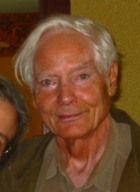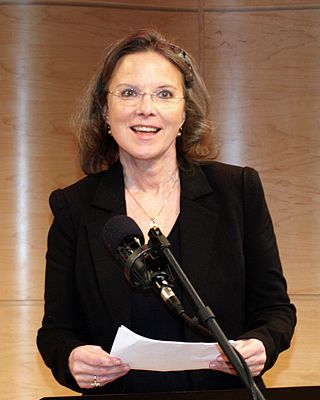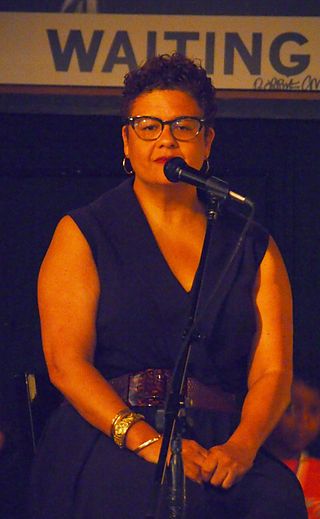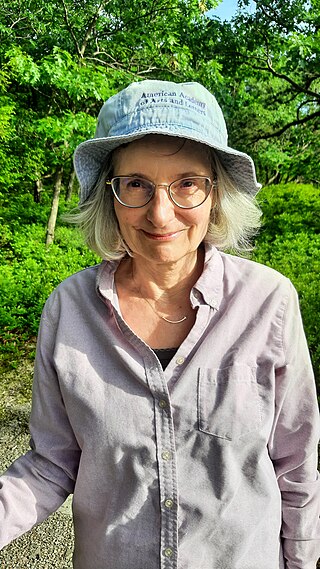Related Research Articles
Marilyn Hacker is an American poet, translator and critic. She is Professor of English emerita at the City College of New York.

Muriel Rukeyser was an American poet, essayist, biographer, and political activist. She wrote poems about equality, feminism, social justice, and Judaism. Kenneth Rexroth said that she was the greatest poet of her "exact generation".

Rita Frances Dove is an American poet and essayist. From 1993 to 1995, she served as Poet Laureate Consultant in Poetry to the Library of Congress. She is the first African American to have been appointed since the position was created by an act of Congress in 1986 from the previous "consultant in poetry" position (1937–86). Dove also received an appointment as "special consultant in poetry" for the Library of Congress's bicentennial year from 1999 to 2000. Dove is the second African American to receive the Pulitzer Prize for Poetry, in 1987, and she served as the Poet Laureate of Virginia from 2004 to 2006. Since 1989, she has been teaching at the University of Virginia in Charlottesville, where she held the chair of Commonwealth Professor of English from 1993 to 2020; as of 2020, she holds the chair of Henry Hoyns Professor of Creative Writing.

William Stanley Merwin was an American poet who wrote more than fifty books of poetry and prose and produced many works in translation. During the 1960s anti-war movement, Merwin's unique craft was thematically characterized by indirect, unpunctuated narration. In the 1980s and 1990s, his writing influence derived from an interest in Buddhist philosophy and deep ecology. Residing in a rural part of Maui, Hawaii, he wrote prolifically and was dedicated to the restoration of the island's rainforests.

Yale University Press is the university press of Yale University. It was founded in 1908 by George Parmly Day and Clarence Day, grandsons of Benjamin Day, and became a department of Yale University in 1961, but it remains financially and operationally autonomous.

Anthony Evan Hecht was an American poet. His work combined a deep interest in form with a passionate desire to confront the horrors of 20th century history, with the Second World War, in which he fought, and the Holocaust being recurrent themes in his work.

Carolyn Forché is an American poet, editor, professor, translator, and human rights advocate. She has received many awards for her literary work.
Flarf poetry was an avant-garde poetry movement of the early 21st century. The term flarf was coined by the poet Gary Sullivan, who also wrote and published the earliest Flarf poems. Its first practitioners, working in loose collaboration on an email mailing list, used an approach that rejected conventional standards of quality and explored subject matter and tonality not typically considered appropriate for poetry. One of their central methods, invented by Drew Gardner, was to mine the Internet with odd search terms then distill the results into humorous or disturbing poems, plays and other texts.
Mary Ruefle is an American poet, essayist, and professor. She has published many collections of poetry, the most recent of which, Dunce, was longlisted for the National Book Award in Poetry and a finalist for the 2020 Pulitzer Prize. Ruefle's debut collection of prose, The Most Of It, appeared in 2008 and her collected lectures, Madness, Rack, and Honey, in 2012, both published by Wave Books. She has also published a book of erasures, A Little White Shadow (2006).

Carl Phillips is an American writer and poet. He is a Professor of English at Washington University in St. Louis. In 2023, he was awarded a Pulitzer Prize for Poetry for his Then the War: And Selected Poems, 2007-2020.
Joshua Marie Wilkinson is an American poet, editor, publisher, and filmmaker.

Elizabeth Alexander is an American poet, writer, and literary scholar who has served as the president of the Andrew W. Mellon Foundation since 2018.

Rosanna Phelps Warren is an American poet and scholar.

John Koethe is an American poet, essayist and professor of philosophy at the University of Wisconsin–Milwaukee.
Jennifer S. Clarvoe is an American poet and English professor at Kenyon College. She has published two books of poetry, Invisible Tender and Counter-Amores. She won the Kate Tufts Discovery Award in 2001.
Terry Randolph Hummer is an American poet, critic, essayist, editor, and professor. His most recent books of poetry are After the Afterlife and the three linked volumes Ephemeron, Skandalon, and Eon. He has published poems in literary journals and magazines including The New Yorker, Harper's, Atlantic Monthly, The Literati Quarterly, Paris Review, and Georgia Review. His honors include a Guggenheim Fellowship inclusion in the 1995 edition of Best American Poetry, the Hanes Prize for Poetry, the Richard Wright Award for Literary Excellence, and three Pushcart Prizes.
Lisa Russ Spaar is a contemporary American poet, professor, and essayist. She is currently a professor of English and Creative Writing at the University of Virginia and the director of the Area Program in Poetry Writing. She is the author of numerous books of poetry, most recently Vanitas, Rough: Poems and Satin Cash: Poems. Her latest collection, Orexia, was published by Persea Books in 2017. Her poem, Temple Gaudete, published in IMAGE Journal, won a 2016 Pushcart Prize.
Beth Ann Gylys is a poet and professor of English and Creative Writing at Georgia State University. She has published five poetry collections, three of which have won awards.
Maureen McLane is an American poet, critic, and professor. She received the National Book Critics Circle Award.

Solmaz Sharif is an Iranian-American poet. Her debut poetry collection, Look, was a finalist for the 2016 National Book Award. She is currently an Assistant Professor of English at UC Berkeley.
References
- 1 2 3 "On the NewsHour: Poet Katherine Larson" Archived 2014-01-17 at the Wayback Machine , PBS NewsHour , 14 March 2012. Retrieved 2012-11-25.
- 1 2 Larson, Katherine. Radial Symmetry, Yale: Yale University Press (2011).
- 1 2 3 4 "Katherine Larson" Archived 2016-03-03 at the Wayback Machine , Poetry Foundation . Retrieved 2012-11-25.
- 1 2 3 4 5 "A Conversation with Katherine Larson" Archived 2013-03-06 at the Wayback Machine , Blackbird , 21 September 2012. Retrieved 2012-11-25.
- ↑ "Scholar Update" Archived 2011-04-27 at the Wayback Machine , Flinn Foundation. Retrieved 2012-05-07.
- 1 2 "Alum adds another major poetry award" Archived 2012-02-11 at the Wayback Machine , Flinn Foundation, 08 February 2012. Retrieved 2012-05-07.
- ↑ "Poet, Scientist Katherine Larson In Pursuit of the Unconscious" Archived 2012-10-14 at the Wayback Machine , UVA Top News Daily, 22 June 2004. Retrieved 2012-11-25.
- 1 2 "Louise Glück Chooses Katherine Larson as 2010 Yale Younger Poet" Archived 2010-07-26 at the Wayback Machine , Yale University Press , 9 March 2010. Retrieved 2012-11-25.
- ↑ "Love at Thirty-two Degrees by Katherine Larson" Archived 2010-08-13 at the Wayback Machine , Poetry , March 2006. Retrieved 2012-11-25.
- ↑ Green, Heather & Larson, Katherine. "Ghost Net Project" Archived 2011-10-09 at the Wayback Machine , 2009. Retrieved 2012-11-25.
- ↑ Regan, Margaret. "Sea Change: Artist Heather Green converts flotsam into something rich and strange" Archived 2012-10-04 at the Wayback Machine , Tucson Weekly , 10 September 2009. Retrieved 2012-11-25.
- ↑ "Oh Earth, Wait for Me": Conversations about Art and Ecology" Archived 2010-07-12 at the Wayback Machine , University of Arizona , September 2009. Retrieved 2012-11-25.
- 1 2 "Radial Symmetry" Archived 2013-12-06 at the Wayback Machine , Yale University Press , 28 March 2011. Retrieved 2012-11-25.
- 1 2 Etter, Carrie. "Radial Symmetry by Katherine Larson" Archived 2017-11-14 at the Wayback Machine , The Independent , 29 May 2011. Retrieved 2012-11-25.
- ↑ Rudick, Nicole. "Staff Picks: Robert Walser, Katherine Larson" Archived 2013-04-23 at the Wayback Machine , The Paris Review , 13 May 2011. Retrieved 2012-11-25.
- ↑ Plunkett, Adam. “Why Critics Praise Bad Poetry” Archived 2011-10-14 at the Wayback Machine , Bookforum , 15 September 2011. Retrieved 2012-11-25.
- ↑ "CGU announces winners of 2012 Kingsley and Kate Tufts Poetry Awards" Archived 2012-02-04 at the Wayback Machine , Claremont Graduate University , 1 February 2012. Retrieved 2012-11-25.
- 1 2 Johnson, Grant. “Writing Allows Me to Approach My Life with a Greater Passion”: Micro-Interview with Katherine Larson" Archived 2016-03-03 at the Wayback Machine , The Kenyon Review , 15 March 2011. Retrieved 2012-11-25.